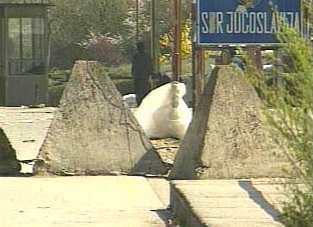 Being a member of the European political class, writes Dalrymple,
Being a member of the European political class, writes Dalrymple,
means never having to say you’re wrong.
As a member of this self-perpetuating magic circle,
you don’t have to learn from experience, consider the evidence, apply logic, or worry about the consequences. There are always expenses at the end of the tunnel.
Like the white man who speaks with forked tongue,
or the Muslim permitted to use taqiyyah to mislead the infidel, the Eurocrat never quite means what he says or says what he means. What he says is compatible with almost anything, and this quality of emptying meaning from grammatically formed sentences full of polysyllables has been a characteristic from the inception of the European Union.
Dalrymple cites one of its founders, Jean Monnet, who said:
We want the Community to be a gradual process of change. Attempting to predict the form it will finally take is therefore a contradiction in terms. Anticipating the outcome kills invention. It is only as we push forwards and upwards that we will discover new horizons.
It would be wrong, says Dalrymple,
to conclude from this mixture of mystical exaltation and interdepartmental memo that Monnet did not know what he was about. He wanted a federal state of Europe, but knew that public opinion would not stand for it anywhere if it were spelt out in so many words (which is why he used so many words). Centralisation by stealth was what was needed.
Take Herman Van Rompuy. His electoral record, Dalrymple notes,
makes Stalin’s shine. Stalin received too many votes, Van Rompuy none at all.
Van Rompuy,
Monnet’s spiritual heir, grey of face, grey of suit, grey of speech, and grey of thought, declared national sovereignty in Europe dead. His position was that of a murderer who stands over his victim’s corpse muttering, ‘He’s gone, he’s gone!’
Dalrymple points to Belgium.
After 180 years of cohabitation, the Walloons and the Flemings cannot agree on common interests deep or wide enough to make a central government acceptable to them both.
One might have thought
that the failure of a country small enough to drive across in two hours to unite after nearly 200 years of experience of trying to forge a workable political identity would give the Eurocrats pause. One would be wrong.
The Eurocrat is
highly imaginative, if an ability not to draw the most obvious conclusions from the most obvious facts, but to draw quite opposite conclusions, counts as imagination.
About Belgium the Eurocrat would say
that the problem is the existence of Belgium, that if only the Flemings and the Walloons could be united administratively with the Lithuanians and the Greeks, the Belgian problem would be solved. Likewise Yugoslavia: If only it had been Euroslavia. The linguistic difficulties entailed are of no account, for everyone — everyone in le tout Bruxelles sense — speaks Engleurish, a kind of Esperanto with the beauties of the latter removed.
To the Eurocrat,
the Finns are really Portuguese, who are really Austrians.
All news is good news to the Eurocrat,
because whatever problem arises leads to the same conclusion: ever closer union.
One might have supposed, for example, that
the slight difficulties over the Greek debt would give intelligent and thoughtful people, and even unintelligent and thoughtless people, reason to wonder whether the single currency had been such a good idea. One would be wrong. In the halls of Eurocracy, they are like the Aztecs who thought that they needed yet more human sacrifices to defeat the Spaniards.
The work of supposedly necessary unification is being carried out by the European Commission,
a body with about as many checks and balances on its exercise of power as the Committees of Public Safety.
It is
carrying out a revolution, though strictly one from above.
Is it not obvious, asks Dalrymple,
that there was a connection between the vaunted unified banking market and the Greek swindle-cum-débâcle? How else would the Greeks have been able to borrow so much for so long on the same terms as the Germans, and reward their grotesquely inflated public sector so magnificently?
To the Eurocrat,
reality is what Nature was to the Marxists, an enemy to be wrestled to the ground, subdued, defeated, in order to yield what Man wanted.
Why, asks Dalrymple, does the Eurocrat
have this impossible dream?
Why does he
treat reality the way Dominique Strauss-Kahn is said to treat women?
The answer is that he is a
frustrated megalomaniac, resentful at the tiny scale of the national stage upon which he would have strutted if national sovereignty still existed.
In the old days, Van Rompuy, for instance,
could have been sent out as governor of an area of Africa 20 times the size of Belgium, impossible to drive across in two months, let alone two hours. Such a position would have been consonant with his estimate of his own talents: likewise with all the other Eurocrats. And this is another way in which the empire strikes back.
















